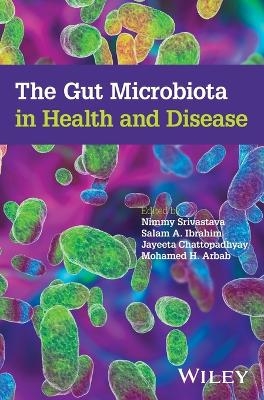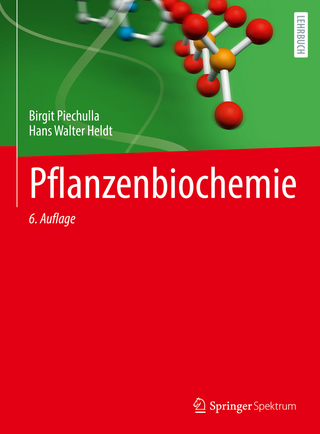
The Gut Microbiota in Health and Disease
John Wiley & Sons Inc (Verlag)
978-1-119-90475-5 (ISBN)
The human gut contains an extraordinary array of microorganisms existing in intricate symbiosis with the body. The gut microbiota plays a crucial role in maintaining overall gut health and warding off disease. With up to 15% of the global population suffering from Irritable Bowel Syndrome (IBS) caused by improper composition of gut microbiota, understanding these organisms and their vital contribution to human health has never been more important.
The Gut Microbiota in Health and Disease provides a concise, accessible introduction to gut microbiota and their contribution to human health. It offers not only an overview of the relevant microorganisms and their roles in the body, but also extended discussion of diseases caused by gut dysbiosis. It presents a crucial window into this growing body of research into a critical area of overall human health.
The Gut Microbiota in Health and Disease, readers will also find:
Detailed analysis of dysbiotic health conditions including obesity, diabetes, and more
Thorough treatment of molecular techniques for the analysis gut microbial composition
Discussion of the lowering diversity of bacteria in the gut and the corresponding impact on global health
The Gut Microbiota in Health and Disease is essential for researchers and clinicians working in immunology, gastroenterology, clinical microbiology, and related fields, as well as for clinical dieticians and postgraduate or medical students studying in these areas.
Nimmy Srivastava, PhD, works as an Assistant Professor of Biotechnology in the Amity Institute of Biotechnology, Amity University Jharkhand. She obtained her PhD in the field of Genetics in 2015 and has received various research fellowships from prestigious organizations including ICFRE and BARC-BRNS (India). Salam A. Ibrahim, PhD, is a Professor of the Food and Nutritional Science program in the Department of Family and Consumer Science at North Carolina Agricultural and Technical State University, North Carolina, USA. He is also the faculty coach for the dairy products evaluation team at the University and has published extensively on food safety, microbiology, and dairy food fermentation. Jayeeta Chattopadhyay, PhD, is an Associate Professor at Amity University Jharkhand, India. She obtained her PhD in new energy engineering with the best doctoral thesis award from Seoul National University of Science and Technology, South Korea (2010). She is also the recipient of the prestigious Fast Track Young Scientist Award, the Department of Science (India). Her research area covers synthesis of special shaped nano-materials. Mohamed H. Arbab, PhD, is an Associate Professor of Medical Microbiology, at Omdurman Ahlia University, Sudan. He has researched and published extensively on infectious diseases, immunopathology, antimicrobial resistance, and related subjects.
List of Contributors xiii
1 Structural and Dynamics of Healthy Adult's Microbiota 1
Mahdi Hussein Abdelrazig
1.1 Introduction 1
2 Composition and Diversity of Gut Microbiota 7
Lisa F.M. Lee Nen That and Jessica Pandohee
2.1 Introduction 7
2.2 Composition and Diversity of Gut Microbiota Throughout Lifespan 8
2.3 Composition of Bacterial Community in the Different Sections of the Gastrointestinal Tract 9
2.4 Stability, Resilience, and Functional Redundancy 10
2.5 Interactions in the Gut Microbiota 11
2.6 Conclusion 13
3 Factors Affecting Composition and Diversity of Gut Microbiota: A Disease Hallmark 17
Rohan Samir Kumar Sachan, Khushboo, Inderpal Devgon, Atif Khurshid Wani, Nahid Akhtar, Tahir ul Gani Mir, Ab Waheed Wani, and Ajit Prakash
3.1 Introduction 17
3.2 Composition of Gut Microbiota 18
3.3 Factors Affecting Gut Microbiota 19
3.4 Modulation of Gut Microbiota 23
3.5 Gut Microbiota Hallmark in Disease Condition 25
3.6 Conclusion 26
4 Antibiotic-Induced Changes in the Composition of the Gut Microbiome 31
Gholamreza Abdi, Abu Saeid, Ab Waheed Wani, and Vishal Johar
4.1 Introduction 31
4.2 Gut Microbiota Composition 32
4.3 Antibiotic-induced Changes in the Composition of the Microbiota 32
4.4 Conclusion 38
5 Dysbiosis and its Varied Impacts 41
Rajani Sharma and Kunal Kumar
5.1 Introduction 41
5.2 Causes of Dysbiosis 41
5.3 Dysbiosis, Immune System, and Associated Diseases 44
5.4 Intestinal Colonisation in Neonates and Dysbiosis 48
5.5 Treatment or Therapeutics 48
5.6 Conclusion 50
6 Connection between Dysbiosis and Diet 55
Sagnik Nag, Nimmy Srivastava, Rohan Dutta, Aparajita Bagchi, Israrahmed Adur, and Shuvam Chakraborty
6.1 Introduction 55
6.2 Different Dietary Patterns Resulting in Dysbiosis 59
6.3 Future Prospects in Establishing a Healthy Connection between Diet and Gut Microbiota 68
6.4 Conclusion 70
7 Composition of Gut Microbiota and Clostridium difficile 81
Jissin Mathew and Anu Jacob
7.1 Introduction 81
8 Gut Microbiota and Obesity 87
Shaimaa H. Negm
8.1 Introduction 87
8.2 Obesity Epidemic: Statistics and General Background 87
8.3 Gut Microbiota and Obesity 87
8.4 Adiposity and Gut Microbiota 90
8.5 Gut Microbiota Modification 92
8.6 The Microbiota and Obesity Interactions 93
9 Gut Microbiota and Cardiovascular Disease 99
Shaimaa H. Negm
9.1 Introduction 99
9.2 Gut Microbiota and CVD 100
9.3 Gut Microbiota Composition in Cardiovascular Disease 101
9.4 Gut Microbiota Function in Cardiovascular Disease 103
9.5 Gut Microbiota as Therapeutic Strategies for Cardiovascular Disease 104
10 Gut Microbiota and Inflammatory Bowel Diseases 109
Anu Jacob and Jissin Mathew
10.1 Introduction 109
10.2 Intestinal Microbiome in IBD Patients 110
10.3 Interventions for the Treatment of IBD 113
10.4 Conclusion 115
11 Gut Microbiota and Diabetes 121
Ankita Dey, Ridashisha Rymbai, Hriiziini Monica, and Jutishna Bora
11.1 Introduction 121
11.2 Gut Microbiota 121
11.3 Role of Gut Microbiota in Diabetes 122
11.4 Alteration in Gut Microbiota Composition in T1 and T2 Diabetes 124
11.5 Diabetic Complications 127
11.6 Therapeutic Approaches 128
11.7 Conclusion 129
12 Novel Therapeutic Strategies Targeting Gut Microbiota to Treat Diseases 133
Shaimaa H. Negm
12.1 Introduction 133
12.2 Changes in the Composition of the Gut Microbiota in Patients with T1D 133
12.3 The Potential Role of the Gut Microbiota in the Development of T1D 134
12.4 Changes in the Composition of the Gut Microbiota in Patients with T2D 135
12.5 The Potential Role of the Gut Microbiota in the Development of T2D 136
12.7 Preventive and Therapeutic Perspectives Including the Gut Microbiota 137
13 Understanding the Role of Microbiota in Cancer 143
Parneet Kaur , Lisa F. M. Lee Nen That , Saurabh Kulshreshtha , and Jessica Pandohee
13.1 Introduction 143
13.2 Role of Microbiota in Cancers 144
13.3 Mechanism in which Microbiota Kill Cancer Cells 146
13.4 Microbiota that Promote Health Post Cancer Treatment 147
13.5 Conclusion 147
14 Impact of Gut Microbiota on Mental Health in Humans 153
Sagnik Nag, Ankita Saini, Richismita Hazra, and Jutishna Bora
14.1 Introduction 153
14.2 Gut Dysbiosis and Mental Health Disorders 156
14.3 Psychiatric Medication and the Microbiome 161
14.4 Probiotic Treatments for Mental Health Disorders 161
14.5 Future Therapeutic Approach 163
14.6 Conclusion 164
15 Interaction between Gut Microbiota and Central and Enteric Nervous Systems: The Gut--Brain Axis Concept 169
Mohamed Hussein Arbab
15.1 Introduction 169
15.2 The Neuronal Communications 170
15.3 Neuroimmune Regulation of Inflammation and Cellular Defence 171
16 Immune-Modulation and Gut Microbiome 179
Sarah Adjei-Fremah, Mulumebet Worku, and Salam Ibrahim
16.1 Introduction 179
16.2 Dysbiosis of the Gut Microbiome 180
16.3 Gut Dysbiosis and Diseases 180
16.4 Gut Microbiome-Mediated Immune Modulation 182
16.5 Gut Microbiome Modulators 183
16.6 Prebiotics 185
16.7 Probiotics 185
16.8 Galectins, Gut Microbiome, and Immune Modulation 186
16.9 Conclusion 186
17 Current Molecular Technologies for Assaying the Gut Microbiota: Next-generation DNA Sequencing 193
Harshit Sajal, Yuvaraj Sivamani, and Sumitha Elayaperumal
17.1 Introduction and Overview 193
17.2 Research on the Gut Microbiome Using Next-generation Sequencing 194
17.3 Collection, Storage, and DNA Extraction Methodology 199
17.4 DNA Sequencing and Post-processing 201
17.5 Metabolic Modelling of the Human Gut Microbiome 201
18 The Role of Probiotics and Prebiotics in Gut Modulation 205
Usman Atique, Muhammad Altaf, Dwaipayan Sinha, Shakira Ghazanfar, Md. Ayenuddin Haque, and Shahana Chowdhury
18.1 Introduction 205
18.2 Probiotics and Prebiotics: A Functional Perspective 206
18.3 Diet and its Effect on Gut Microbiota 208
18.4 Modification of Intestinal Microbiota by the Application of Probiotics and Prebiotics 209
18.5 Prebiotics and Gut Immunity 211
18.6 Conclusions and Future Research 211
19 Probiotics, Prebiotics, and Synbiotics: A Potential Source for a Healthy Gut 217
Vandana Singh and Bushra Shaida
19.1 Introduction 217
19.2 Prebiotics 218
19.3 Probiotics 221
19.4 Synbiotics 227
19.5 Conclusion 228
20 Current Status and Efficacy of Fecal Microbiota Transplantation for Patients Suffering from Irritable Bowel Syndrome 231
Mohamed Hussein Arbab
20.1 Introduction 231
20.2 Donor Selection 232
20.3 Safety Issues of FMT for IBS 233
20.4 Possible Mechanisms Underlying the Effects of FMT 234
20.5 Conclusion and Perspective 234
References 235
Index 239
| Erscheinungsdatum | 30.09.2023 |
|---|---|
| Verlagsort | New York |
| Sprache | englisch |
| Maße | 177 x 253 mm |
| Gewicht | 624 g |
| Themenwelt | Medizin / Pharmazie ► Medizinische Fachgebiete |
| Medizin / Pharmazie ► Naturheilkunde | |
| Naturwissenschaften ► Biologie ► Biochemie | |
| ISBN-10 | 1-119-90475-7 / 1119904757 |
| ISBN-13 | 978-1-119-90475-5 / 9781119904755 |
| Zustand | Neuware |
| Haben Sie eine Frage zum Produkt? |
aus dem Bereich


